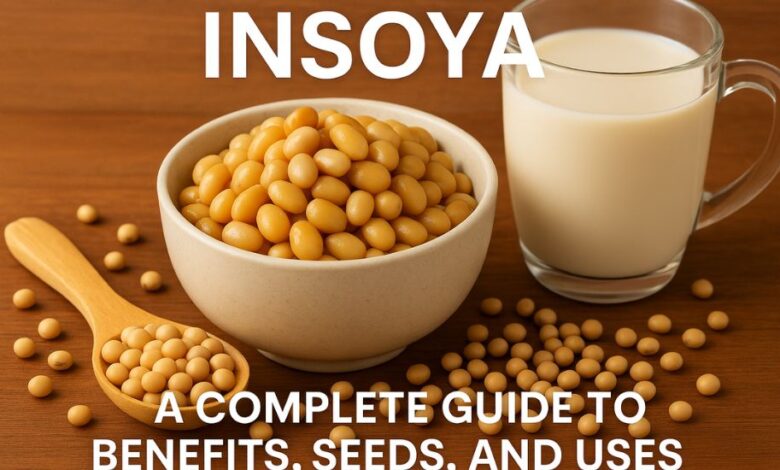Insoya: Benefits, Seeds, and Modern Plant-Based Nutrition

The term Insoya has gained attention in recent years across wellness blogs and plant-based lifestyle websites. While not a formal scientific classification, Insoya is used to describe soy or soybean–based products, foods, and innovations that highlight soy’s nutritional, health, and sustainable qualities. Whether it refers to Insoya seeds (soybeans themselves), Insoya-based plant products, or modern soy innovations, the focus is the same: bringing the power of soy into daily living.
This article explores Insoya benefits, the nutritional value of Insoya seeds, and why soy remains one of the most important plant-based foods worldwide.
The History and Background of Soy
Soybeans have been cultivated for thousands of years, with roots in East Asia where they were prized for their versatility. Over time, soy spread globally, becoming a staple in foods such as tofu, tempeh, soy milk, miso, and modern plant-based meat alternatives.
Insoya, in the modern sense, represents not just traditional soy but also innovations in soy processing that improve taste, digestibility, and environmental footprint. This new framing positions soy as a core solution in the plant-based revolution.
What Are Insoya Seeds?
When people speak about Insoya seeds, they’re usually referring to soybeans in their whole, natural form. These seeds are small, oval-shaped legumes that can be eaten fresh, roasted, sprouted, or processed into countless soy-based products.
Nutritional highlights of Insoya seeds (soybeans):
-
Protein: Rich in all essential amino acids, making soy a complete plant protein.
-
Fiber: Supports digestion and gut health.
-
Micronutrients: Contains potassium, magnesium, B vitamins, iron, and calcium.
-
Isoflavones: Plant compounds with antioxidant properties linked to heart and hormonal health.
Soybeans are versatile—commonly consumed as edamame, roasted snacks, soy flour, soy milk, tofu, and textured protein.
Key Insoya Benefits
1. Rich Source of Plant-Based Protein
One of the strongest Insoya benefits is its high-quality protein. Unlike many plant proteins, soy provides all nine essential amino acids, making it comparable to animal protein. For vegetarians and vegans, Insoya products offer an excellent protein source without animal fat or cholesterol.
2. Supports Heart Health
Research suggests that soy protein and isoflavones may help reduce LDL (“bad”) cholesterol and support cardiovascular health. Populations that traditionally consume high levels of soy often show lower risks of heart disease compared to Western diets high in saturated fat.
3. Benefits for Women’s Health
Isoflavones found in Insoya seeds act as phytoestrogens—plant compounds with weak estrogen-like effects. For women, particularly those experiencing menopause, soy may help ease hot flashes, support bone health, and balance hormones. While effects vary, it’s a natural alternative many women include in their diets.
4. Digestive and Weight Management Support
The fiber content in soybeans supports digestion, reduces bloating, and promotes healthy gut bacteria. Combined with its protein, Insoya products can also help with appetite regulation and weight management, as protein increases satiety.
5. Sustainability and Environmental Benefits
Soy has been recognized for its role in sustainable agriculture. As a legume, soy plants fix nitrogen into the soil, reducing the need for synthetic fertilizers. Compared to animal protein production, soy-based foods generally require fewer resources and generate lower greenhouse gas emissions.
6. Skin and Hair Wellness (Emerging Trend)
Some wellness blogs also highlight Insoya’s role in skincare and haircare, pointing to soy isoflavones and proteins being incorporated into beauty products. These claims are less established but add to Insoya’s popularity in the lifestyle and self-care space.
Common Uses of Insoya Seeds
-
Roasted Snacks – Crunchy roasted soybeans provide a protein-rich, fiber-filled snack.
-
Smoothies & Protein Shakes – Soy protein powder blends well for post-workout nutrition.
-
Salads & Bowls – Whole soybeans or edamame add texture, protein, and nutrients.
-
Plant-Based Meats – Soy is a key ingredient in vegetarian burgers, sausages, and “chicken” substitutes.
-
Baking & Cooking – Soy flour and soy milk are used in breads, pastries, and sauces.
-
Traditional Foods – Tofu, tempeh, miso, and natto are classic soy-based foods with global appeal.
Myths and Misconceptions About Insoya
-
“Soy causes hormone imbalance in men.”
Scientific studies show moderate soy intake does not lower testosterone or harm male fertility. -
“Soy is unsafe for thyroid health.”
For people with iodine deficiency, very high soy intake may impact thyroid hormones, but with adequate iodine in the diet, soy poses no concern. -
“All soy is genetically modified (GMO).”
While a large portion of soy crops are GMO, many non-GMO and organic soy products (including those marketed as Insoya) are available.
By clarifying these misconceptions, readers can better understand how to safely include Insoya in their diets.
Who Should Be Careful With Insoya?
-
People with Soy Allergies: Soy is one of the top food allergens, particularly in children. Allergic individuals must avoid soy completely.
-
Individuals on Thyroid Medication: While safe for most, consult a doctor if you have thyroid disease and consume large amounts of soy.
-
High Supplement Use: Isoflavone supplements are different from soy foods; always prioritize whole food forms of Insoya for balance and safety.
Insoya and the Future of Plant-Based Nutrition
The growing popularity of Insoya aligns with the global shift toward plant-based diets. With increasing awareness of climate change, sustainability, and health-conscious lifestyles, Insoya products are expected to gain even more visibility.
Food companies are experimenting with:
-
Improved soy textures and flavors for meat alternatives.
-
Soy protein isolates that enhance digestibility and reduce allergens.
-
Soy-based dairy alternatives (soy yogurt, soy cheese, soy lattes).
-
Wellness products incorporating soy isoflavones in supplements and skincare.
In this way, Insoya is not just food—it’s part of a cultural and lifestyle movement toward sustainability and health.
Conclusion: Embracing the Insoya Lifestyle
Insoya represents the versatility, nutrition, and sustainability of soybeans, rebranded for today’s plant-based generation. From protein-packed Insoya seeds to innovative soy products, the benefits span across health, wellness, and the environment.
For those seeking a balanced diet, sustainable living, or plant-based protein, Insoya offers a pathway to wellness grounded in one of nature’s most powerful seeds.
To explore more wellness and nutrition articles like this, visit Blog Loom, your trusted source for health and lifestyle insights.



